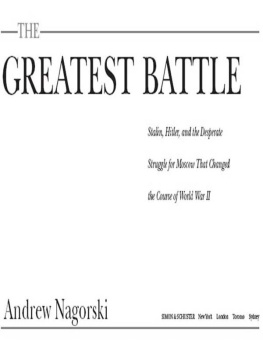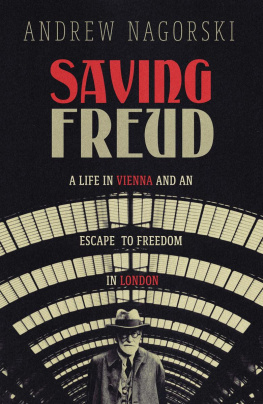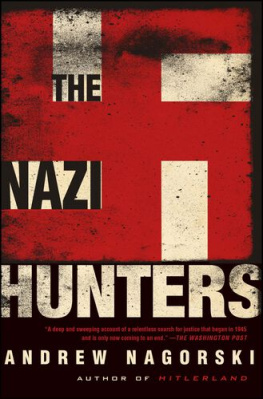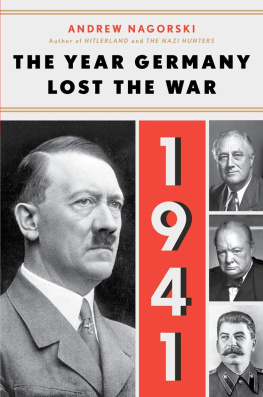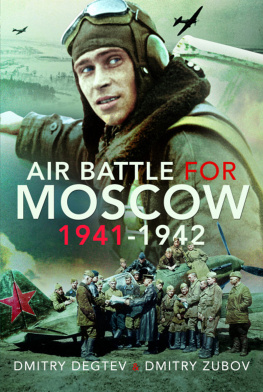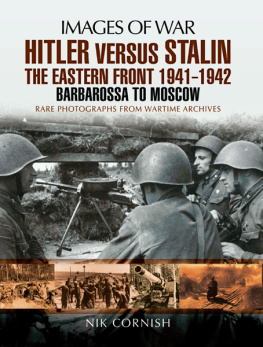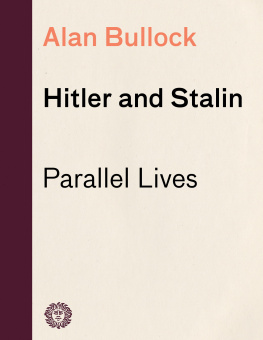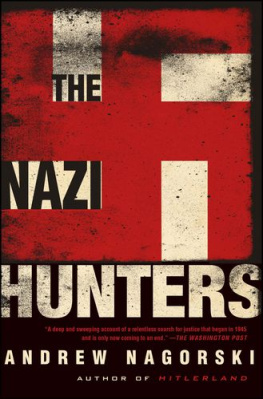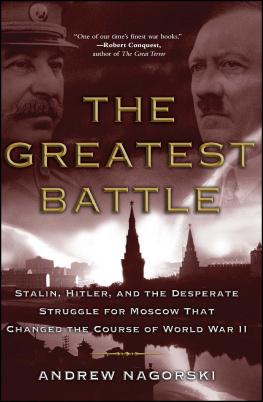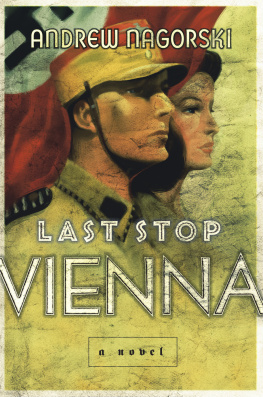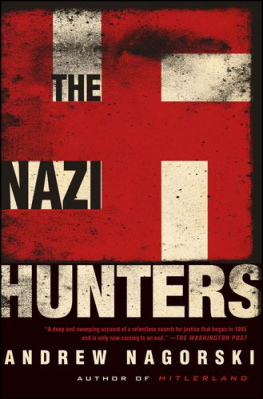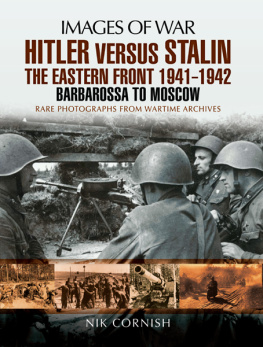ALSO BY ANDREW NAGORSKI
Last Stop Vienna
The Birth of Freedom:
Shaping Lives and Societies in the New Eastern Europe
Reluctant Farewell:
An American Reporters Candid Look Inside the Soviet Union

SIMON & SCHUSTER
1230 Avenue of the Americas
New York, NY 10020
Copyright 2007 by Andrew Nagorski
All rights reserved, including the right to reproduce this book or portions thereof in any form whatsoever. For information address Simon & Schuster Subsidiary Rights Department, 1230 Avenue of the Americas, New York, NY 10020.
SIMON & SCHUSTER and colophon are registered trademarks of Simon & Schuster, Inc.
Images in the picture section are credited as follows:
AP/Wide World Photos: 1, 2, 3
Franklin D. Roosevelt Library: 4
Library of Congress Cataloging-in-Publication Data
Nagorski, Andrew.
The greatest battle : Stalin, Hitler, and the desperate struggle for Moscow that changed the course of World War II / Andrew Nagorski.
p. cm.
Includes bibliographical references and index.
1. Moscow, Battle of, Moscow, Russia, 19411942. 2. Stalin, Joseph, 18791953Military leadership. 3. Hitler, Adolf, 18891945Military leadership. I. Title.
D764.3.M6N33 2007
940.54'214731dc22 2007017053
ISBN-13: 978-1-4165-4573-6
ISBN-10: 1-4165-4573-5
Visit us on the World Wide Web:
http://www.SimonSays.com
For Stella,
the first of the next generation
And, as always,
for Krysia
We will break them soon, its only a question of timeMoscow will be attacked and will fall, then we will have won the war.
Hitler speaking to an aide in mid-September 1941
Are you sure we are going to be able to hold Moscow? I am asking with an aching heart.
Stalin in a phone call to General Georgy Zhukov in mid-November 1941
Contents
A Note on Transliteration
The transliteration system found in the body of this book is the one that is usually used by the American media. Although it is not always totally consistent, it is considered the simplest and most readable. The system used in the endnotes and bibliography, however, is the Library of Congress system, which is commonly employed by U.S. libraries. In the case of Russian works that have been translated previously into English, the spelling of the authors names has been adopted as published.
Introduction
In the fall of 1941, two gargantuan armies fiercely fought each other on the northern, southern, and western approaches to Moscow. On both sides it wasnt so much the generals who were calling the shots as the tyrants Adolf Hitler and Joseph Stalin. Those two leaders issued everyone their orders, never hesitating to send millions to their death whether in combat or in prisons and the camps. Both demonstrated ruthless resolve and, at times, brilliant tactics, but they were also prone to strategic shortsightedness on a colossal scale.
Hitler dispatched his armies deep into Russia without winter clothing, since he was convinced they would triumph long before the first frosts arrived. Stalin sent many of his troops into battle without guns, since he hadnt prepared the nation for the German onslaught. This doomed countless thousands of Germans to death by freezing in the first winter of the Russian campaign and countless thousands of Red Army soldiers to instant death because they did not survive long enough to pick up whatever weapon they could find among the dead and the dying.
The battle for Moscow, which officially lasted from September 30, 1941, to April 20, 1942, but in reality spanned more than those 203 days of unremitting mass murder, marked the first time that Hitlers armies failed to triumph with their Blitzkrieg tactics. When those armies had crushed Poland, France and much of the rest of Europe with breathtaking speed, they had looked unstoppable. This defeat, however, was more than just another lost battle, Fabian von Schlabrendorff, one of the German officers who later joined the conspiracy against Hitler, recalled in his memoirs. With it went the myth of the invincibility of the German soldier. It was the beginning of the end. The German army never completely recovered from that defeat. True enough, but the German forces would continue to fight with astonishing tenacity, and their ultimate defeat was still a long way off, which is why such judgments have been rendered only with the benefit of hindsight.
The battle for Moscow was arguably the most important battle of World War II and inarguably the largest battle between two armies of all time. Combining the totals for both sides, approximately seven million troops were involved in some portion of this battle. Of those seven million, 2.5 million were killed, taken prisoner, missing or wounded badly enough to require hospitalizationwith the losses far heavier on the Soviet than on the German side. According to Russian military records, 958,000 Soviet soldiers perished, which included those killed, missing or taken prisoner. Given the treatment they received at the hands of their captors, most Soviet POWs were, in effect, condemned to death. Another 938,500 soldiers were hospitalized for their wounds, which brought overall Soviet losses to 1,896,500. The corresponding number for the German forces was 615,000.
By comparison, the losses for other epic battles, while horrific, never reached those kinds of figures. In the popular imagination, the battle for Stalingrad, from July 1942 to early February 1943, is generally considered the bloodiest of those struggles. It was huge but never approached the size of the battle for Moscow. About half the number of troops3.6 millionwere involved, and the combined losses of the two sides were 912,000 troops, as compared to the 2.5 million in the Moscow battle.
None of the other major battles of the two world wars come much closer to Moscows tallies. In the battle of Gallipoli in 1915, for example, the combined losses of the Turkish and Allied troops were roughly 500,000; for the battle of the Somme, from July to October 1916, German, British and French losses totaled about 1.1 million. And just in terms of the numbers of troops involved in the fighting, many other legendary battles of World War II werent even in the same league as the battle for Moscow. At the pivotal battle of El Alamein during the North African campaign, for example, the opposing armies totaled 310,000.
This was also a battle that was played out in front of a global audience, with the United States, Britain, Japan and others making key decisions based on their assessments of its likely outcome. Theres no doubt that if the Germans hadnt been stopped at the outskirts of Moscow, the repercussions would have been felt around the world.
And yet the battle for Moscow is now largely forgotten. Historians have paid far more attention both to the battles of Stalingrad and the Kursk salient, which represented clear-cut victories over Hitlers forces, and to the searing human drama of the siege of Leningrad. By contrast, the battle for Moscow was marred by too many errors and miscalculations by Stalin and raised too many unsettling questions to be subject to the same level of attention. As a result, it was often hastily dealt with in the history books and has never attained the mythological status of the later victories. But its precisely because of its crucial role in the early period of World War II and what it reveals about the nature of the totalitarian giants who faced off against each other that the real story of the battle for Moscow has to be told, elevating this battle to its proper place in the history of the war.

